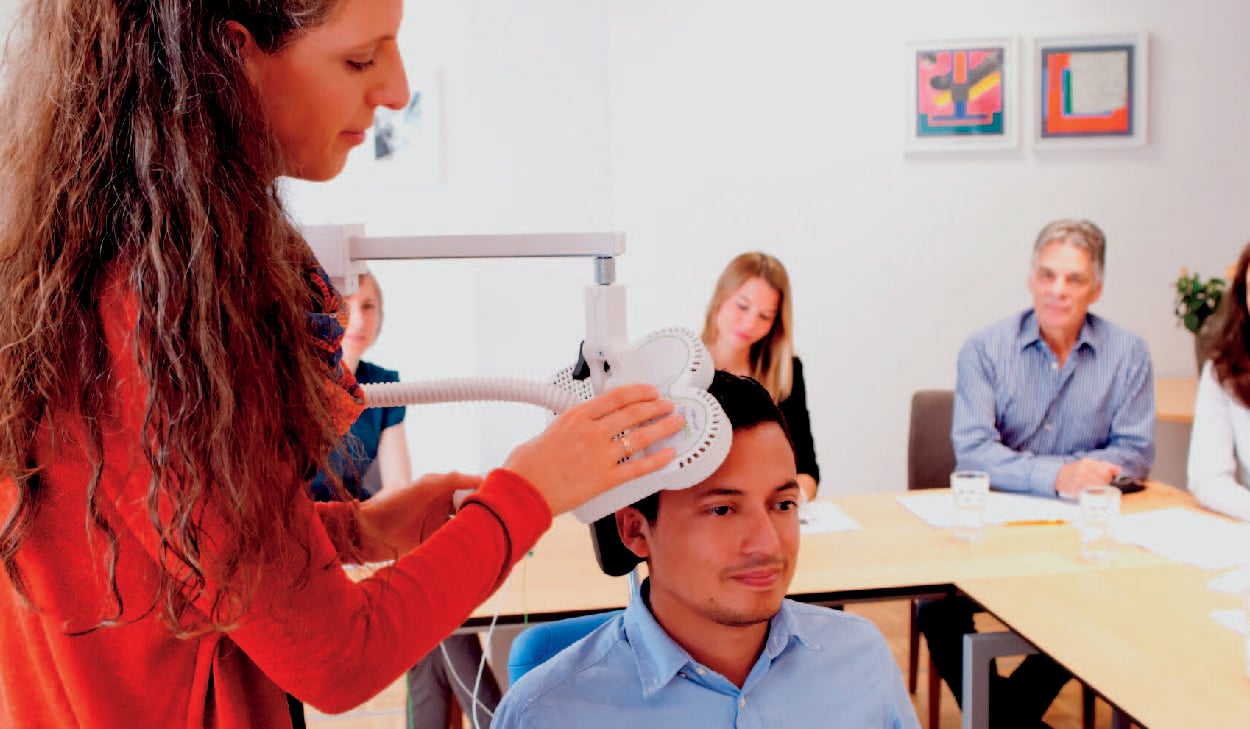Collaborative Care
For Psychiatrists and Psychologists

Straight to:
At Smart TMS, we understand that no one knows your patient better than you do. Our mission is to provide cutting-edge TMS treatment while keeping you — the referring psychiatrist or psychologist — at the heart of their care.
We’ve developed two partnership pathways that empower psychiatrists and psychologists to stay connected, expand their practice, and enhance patient outcomes.
Shared Care
Our Shared Care Model is designed for psychiatrists or psychologists who refer patients to Smart TMS and want to maintain a consistent role throughout the treatment journey. We bring you into our multidisciplinary team, giving you full visibility of your patient’s TMS course and ensuring continuity of care.
Practising Privileges
For psychiatrists and psychologists looking to take a more proactive role — or explore offering TMS services without investing in equipment or CQC registration — our Practising Privileges Program is the ideal solution.
Shared Care Model: A Collaborative Approach to Patient Recovery

At Smart TMS, we believe that exceptional patient outcomes are achieved through collaboration, consistency, and continuity. Our Shared Care Agreement has been specifically designed to support Consultant Psychiatrists and psychologists who refer patients for TMS treatment — ensuring that your clinical expertise remains central throughout the course of therapy.
Too often, we’ve seen patients referred for TMS experience a disruption in continuity of care, leaving their referring psychiatrist disconnected from progress or unable to provide timely aftercare. With our Shared Care Model, you remain actively involved every step of the way.
How Shared Care Works:
-
Ongoing Collaboration: Become part of the Smart TMS multidisciplinary team (with patient consent), working alongside our TMS practitioners, clinicians, and medical director.
-
Daily Clinical Updates: Receive concise daily reports on treatment progress, including psychometric scores and clinical notes, to maintain visibility.
-
Two-Way Communication: Share psychiatric reviews, medication changes, or clinical concerns with our team. We will also consult you on any patient safety or continuity issues.
-
Post-Treatment Continuity: You’ll receive a comprehensive discharge summary, ensuring seamless reintegration back into your ongoing care plan.
Benefits for You and Your Patients:
-
Protect the therapeutic relationship by staying fully informed and involved.
-
Enhance patient outcomes with a unified, coordinated treatment journey.
-
Streamline communication while retaining clinical autonomy.
This model doesn’t just maintain care — it strengthens it. You remain the patient’s trusted psychiatrist while leveraging the specialised resources of Smart TMS.
Smart TMS Practising Privileges Program: Build Your Own Virtual Clinic

For psychiatrists and psychologists who want deeper involvement — or are considering offering TMS services directly — we offer an innovative solution: the Smart TMS Practising Privileges Program.
This model allows you to establish a “virtual” TMS clinic within Smart TMS, giving you full clinical oversight and financial participation, without the cost, complexity, or regulatory burden of setting up a physical clinic.
What’s Included:
- Non-refundable Assessment Fee: You conduct the initial clinical assessment and retain the full fee.
- Revenue Share: Earn a portion of treatment revenue as patients progress through their course.
-
No Setup Costs: No need to purchase equipment, employ technicians, or register with the CQC.
-
Smart TMS Infrastructure: Use our facilities, clinical team, admin support, and digital systems while retaining your identity and practice independence.
Typical Patient Journey:
-
You refer and assess the patient and prescribe TMS using our shared format.
-
Smart TMS contacts the patient and begins treatment.
-
You remain involved through reviews and updates.
-
You receive assessment and treatment revenue based on completed sessions.
Why Partner with Smart TMS?
-
Strengthen your practice with access to cutting-edge, evidence-based treatment.
-
Improve outcomes with a seamless, well-coordinated care model.
-
Gain income while preserving your clinical autonomy.
-
Avoid capital costs, staffing challenges, and compliance hurdles.
-
Stay connected with your patients at every step of their journey.
.jpg?width=1100&height=750&name=ADHD%20assessment%20(3).jpg)
Partnerships Guide
Conditions TMS treats
Depression
TMS compared to other treatments
| Treatment | TMS | ECT | Antidepressants |
|---|---|---|---|
| Description | Non-invasive magnetic fields | Electrical current to induce seizure | Oral medication |
| NICE approved | ✓ | ✓ | ✓ |
| Non-invasive | ✓ | ✘ | ✓ |
| Outpatient treatment | ✓ | ✘ | ✓ |
| Ongoing recovery | ✓ | ✘ | ✘ |
| Side-effects | Mild headaches Mild fatigue 1 in 50,000 risk of seizures |
Confusion Disorientation Headaches Intense sleepiness Jaw ache Anesthetic complications Memory loss Muscle aches Nausea |
Anxiety Diarrhoea Dizziness Fatigue Headache Increased appetite Migraine Nausea Nervousness Sleep problems Sexual dysfunction Weight gain |
"I have had the opportunity refer some of my patients to Smart TMS. The Patients have come back and fed back that they have had a very comprehensive assessment, detailed explanation for the treatment and its expected effects. It has been impressive to see the patients’ journey. My compliments for Smart TMS"
"I have referred a number of patients to Smart TMS and have been extremely pleased with the outcome. From the efficiency of the referral pathway through the treatment process and advice along the way to the discharge process and aftercare – all patients have reported how at ease and relaxed they felt by the team and were very pleased with the results. I have no hesitation in recommending Smart TMS"
"Everyone I dealt with was extremely friendly, helpful and supportive. Having suffered from treatment resistant depression, I feel I can now face so much of the major stressors in my life. This has been such a successful treatment for me and if you compare it to a recurring prescription of therapy, it works out so much more affordable without any side effects."
Transcranial Magnetic Stimulation FAQs
-
Repetitive Transcranial Magnetic Stimulation (or rTMS for short) is a treatment for depression, OCD, addictions and other mental health conditions. The rTMS machine emits high frequency magnetic pulses to the area of the brain known to cause the condition. The treatment stimulates the brain and causes ‘neuroplasticity’ – which is the brain’s ability to mend and build connections between the nerve cells. In the case of depression, for example, the left side of the prefrontal cortex is stimulated, restoring the connections to help it work as it should, without the symptoms of depression.
-
Although similar, rTMS is more commonly used. Repetitive Transcranial Magnetic Stimulation, which is the NICE approved treatment offered by Smart TMS, uses a magnet referred to by professionals as a ‘figure of eight coil’. This coil emits repetitive magnetic pulses to the specific area of the brain known to cause the condition being treated. In comparison, deep Transcranial Magnetic Stimulation, or dTMS, uses a ‘H-coil’, which looks like a helmet. The magnetic pulses are emitted on a much larger area of the brain as it’s much less focused than rTMS.
-
rTMS is a private treatment and costs vary depending on the condition being treated. An average course of treatment for depression with Smart TMS costs £3,000 and you are likely to need two courses in total.
-
As research progresses, it becomes clear that with regular maintenance sessions (one per month) the benefits of rTMS treatment are on-going. Life can have its ups and downs, but once we know that rTMS treatment works for you, we can offer “top up” sessions whenever you feel you need a boost.
-
There is no research to suggest that rTMS can cause memory loss. rTMS is often compared to ECT (electroconvulsive therapy), which does cause memory loss, however rTMS is non-invasive and only targets a small area of the brain, as opposed to inducing seizures like ECT does.
-
Yes – rTMS is effective in the treatment of Generalised Anxiety Disorder. At Smart TMS, we know that depression and anxiety often go hand in hand, so we offer all patients the opportunity to be treated for both at the same time. Other providers can charge separately for courses of depression and anxiety treatment, but we include them in the same treatment session, saving you (in some cases) thousands of pounds.
-
“Success” is hard to quantify when talking about mental health. The remission rate of patients suffering with depression at Smart TMS is 49%. This means 49% of patients are no longer clinically depressed following rTMS treatment. Our research shows that 56% patients also see a significant change in their mood, even if they don’t officially reach the point of remission, which helps them lead a happy and fulfilling life with fewer symptoms than before.
Professional Training & Partnership Opportunities
Learn more about professional training opportunities through neurocare academy and partnerships with Smart TMS clinics.










